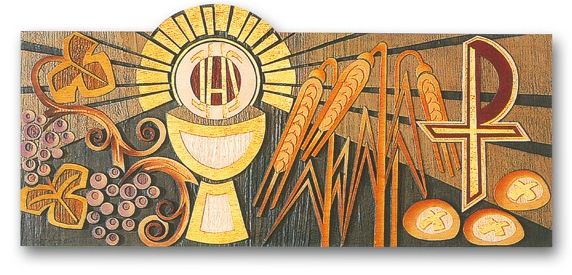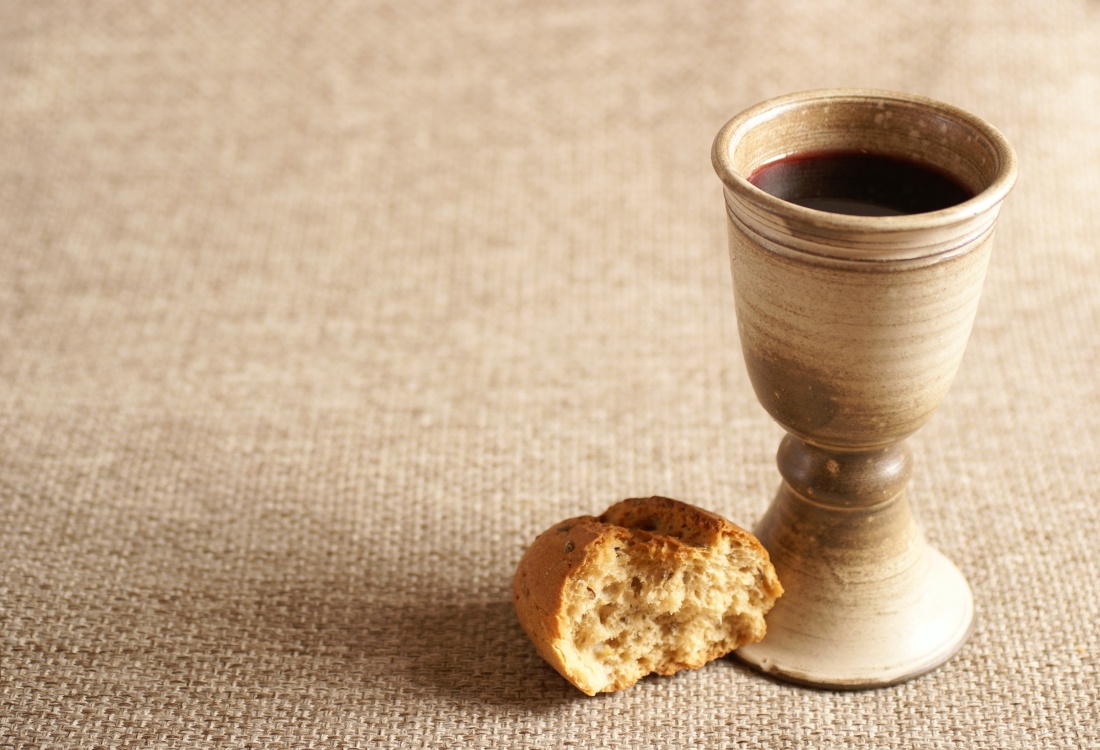a sermon for the fourteenth Sunday after Pentecost [Proper 16B/Lectionary 21]
John 6:56-69 and Ephesians 6:10-20

It was my first Sunday here at Epiphany, about ten years ago. I was still in the interview process to be the associate pastor and was here to preach and help lead worship, kind of like an audition. Everything went fairly well, but the thing that really stuck out to me that day was the communion bread. For whatever reason, the pita loaves had gotten left out of its bag the night before and by the time we went to serve it the next morning, it was all dry and hard and stale. When Pastor Chris Price and I worked our way down the rail for communion, each piece we broke off made this loud cracking noise. I kind of had to get my wrist into it just to tear them off. The pieces were very chewy and rough, like we were handing out crackers. People were crunching on them.
But I didn’t know any different, you see. It was my first Sunday here, and I just thought that was the way Epiphany Lutheran liked communion. They like their bread tough and hard to chew. No judgment here. It wasn’t until after the service was over when Pastor Chris Price, the senior pastor at that time, assured me that typically the bread they used was typically soft.
Be that as it may, I think Jesus is content to give us hard, chewy bread most of the time. I don’t think Jesus is bothered by how difficult it might be to break off, tear apart, swallow, digest. And I’m not talking about the communion bread, necessarily. I’m talking about his teachings, the things he says to us, the lessons he gives. Jesus works his way down the rail, down the paths of our life encountering us in his Word and in the communal life of his people gathered, and he doesn’t seem to be concerned if things are hard to choke down.
Is this your typical impression of Jesus? I’m not sure it’s always mine. I’m not sure I think often about this difficult Jesus, this content-to-be-offensive Jesus, this “take-me-or-leave-me” Jesus. I know I am usually most familiar with the easy Jesus, the chasing-after-lost-sheep Jesus, the boil-things-down-to-make-it-simple Jesus.
But today we see him standing there with a crowd of followers around him. He has just fed thousands with a few loaves and two fish—loaves that were probably fresh and soft—and he hears his disciples complaining about his teaching. They’re complaining because what he’s said is too hard to accept. It’s too hard to receive his lesson about his body, broken and shared for the life of the world, and how partaking of that flesh and that blood connects them to the eternal life that he has.

We know this similar reaction occurs with any number of Jesus’ teachings, not just this one about his presence in the bread and the wine. We’re told many of them turn back at that point and no longer go about with him. And he doesn’t chase after them. Jesus doesn’t say, “Yikes! The numbers of religiously unaffiliated is on the rise in our culture today! People are leaving the church! Let’s do whatever we can to get them to come back with us!” Instead, he lets them turn back if they want to.
I’m not sure this impression of Jesus is always mine, but I bet it needs to be. It needs to be because I am so tempted to think God always agrees with me and what I think about any given issue or cause. I don’t know about you, but I am also often tempted to think the easy way, the easy answer, is the right one. I am so easily convinced that matters of faith and belief should never be difficult to digest, that they should instead be something I can figure out on my own, or fit in nicely with what I already know, and they’re especially useful if I can pick and choose what I want to believe. But perhaps most dangerously, I’m easily wooed into thinking faith is a kind of secret charm, that if I have it, that if I believe in God and do what I’m supposed to, I’ll escape or avoid all trouble in life.
The Jesus we encounter today, who gives us tough, chewy bread, flies in the face of all of that: “It is the spirit that gives life; the flesh is useless.” That is, when it comes to a relationship with the eternal God, what we do on our own—muscle and will-power—aren’t helpful. Those things ultimately get us nowhere. What Jesus speaks to us and gives to us is what is life-giving, lasting.
“No one can come to me unless it is granted by the Father.” In other words, faith is a gift. It is a trust that God cultivates in us that gets us to follow and listen more closely through whatever comes our way. That’s the whole point of Paul’s conclusion to his letter to the Ephesians. God doesn’t outfit us with a parachute a magic wand or a secret tunnel to safety. God gives us armor because he expects us to withstand the trials we face, to stand firm and endure.
And tough, chewy words from Jesus are the kinds of things that sustain that kind of faith. They tend to last. They tend to stick with you, especially in the difficult times ahead.

Our ninth and tenth graders are preparing in a few weeks to begin another year of confirmation classes. We’ll meet about every other Wednesday evening for ninety minutes, and I know that many of them will question, just like I did when I was there age, what is the point of all of this. Why does the church invite its young people to profess their faith publicly, and why do we have them come to classes and learn things like the Ten Commandments, the Sacraments, and the Creed? There are so many other things they could be doing with their time, and so many other ways, perhaps, to come at the faith. I can think of several reasons we do this, but one might be is to make sure we introduce them to this Jesus who hands out tough bread, to chew together on some of the life-giving things he says.
Interestingly enough, one of the stories that is being told about Senator John McCain in the wake of his death is of the “informal worship services he had with his fellow prisoners of war [in Vietnam], toward the end of the war when they were out of isolation. McCain [said he] was named room chaplain, ‘not because the senior ranking officer thought I was imbued with any particular extra brand of religion, but because I knew all of the words of the Apostles’ Creed and the Nicene Creed.’”[1]

We live in day and age when people are geared toward this idea of self-fulfillment. I know I see myself in this culture’s values. Linda Mercadante, professor at the Methodist Seminary in Ohio author and expert on people who claim to be spiritual but not religious, says that our system of morality is geared towards making the most of it, of stacking our lives with experiences we won’t regret, of choosing adventure and accumulating our identity from the world of options around us. Our quests these days are for personal meaning. The questions revolve not around “Where do I belong?” for example, but “Who am I?”
In this kind of moral landscape, religions—and really any communal faith practices or wisdom—often appear to demand too much giving up of personal liberty and the center of authority has shifted from “out there” to “in here.” We view ourselves as the most authentic and most true judge of what we need. We even do this with Christian faith, adding what we like here, taking out what we don’t like over there, seeing time in church on Sunday primarily as something that fills us up, recharges our batteries, rather than worship of a higher power, something that joins us to a crowd that heeds an outside authority. And I suppose there is some good to this, some enjoyment to be had, ideas to be explored. God gives us a brain to be discerning and call out error when we see it. Besides, to some degree, there’s little we can really do about this individualistic mentality. It’s the era we’ve inherited.

Into all of this, into all of this navel-gazing and skepticism, this confident Jesus strides just like he does after that miraculous meal of loaves and fishes and asks us, “Do you also wish to go away? Do you also wish to turn back, leave me here?” And with the faith of Peter may we say, “Lord to whom shall we go? You have the words of eternal life.”
Because, truth be told, all other ways we might tread run dry and turn up empty. I don’t know how Peter knows that already, but he seems to. Usually after great heartache we see how those other paths end in emptiness, loss, isolation, failure. Jesus knows this. He knows that that all ways of humankind eventually lead to the cross.
And, as it turns out, there aren’t two different Jesuses—a hard-edged one and a gentle one. There is one Jesus—one who is always giving life, always reaching out, always extending that call to follow and take up the armor of faith. And that one confident, loving Jesus will be at the cross, too, at the dead end of all the other paths we might choose. For he…
suffered under Pontius Pilate
was crucified, died, and was buried.
He descended to the dead.
But on the third day he rose again.
This Jesus will be at the cross waiting, but he will be there with eternal life for each of us, defeating the harsh with the humble. There he will be with mercy and forgiveness and welcome. And there we will hear his Words and they will heal us, once and for all. And he will raise us up on the Last Day.
We come to the rail today, weary and worn, some of us perhaps a little testy, belligerent, doubtful, begrudging, selfish, wanting something easy. I can guarantee we’ll receive something good. And with bread between our teeth, we come and receive another invitation not to turn back and to keep on walking with Jesus now, the Lord of life, the one who conquers the grave. Might as well keep walking with him. Might as well.
Thanks be to God!

The Reverend Phillip W. Martin, Jr.
[1] https://www.csmonitor.com/USA/Politics/2018/0825/Remembering-John-McCain-the-quintessential-patriot





